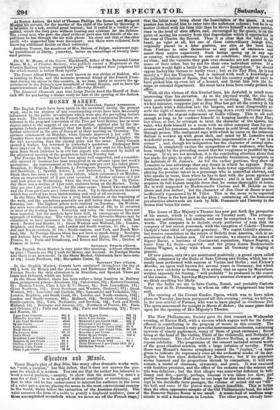C4flItrES lila 31115 I r.
Victor Hugo's play of Buy Bias, like many other dramatic works writ- ten "with a purpose," has this defect, that it does not answer the pur- pose for which it is written. You can see that the author has laboured to work a social problem,—namely, to show that the maxim "a man's a man for a' that" is to be adopted without condition or restriction ; and that to this end he has endeavoured to interest his audience in the loves of a valet and a queen, placing the scene in the most conventional country in the world, Spain before the extinction of the Austrian dynasty. The valet assumes the form of a noble to gratify a displaced minister, (one of those accomplished scoundrels whom we never see off the French stage,) that the latter may bring about the humiliation of the queen. A real passion has induced him to enter into the nefarious scheme; but he is no sooner clothed with his false title than he shows himself a sincere patriot, rises to the head of state affairs, and, encouraged by the queen, is on the point of saving his country from that degradation which it approached in the time of Charles the Second. Thus it is clear that the valet is at heart, no valet at all, but one of those extraordinary beings who, originally placed in a false position, are able at the least hint from Fortune to raise themselves to any pitch of eminence and assert their native superiority. Such beings spring up in any age or country, without reference to caste or condition; they are types of no class; and the victories they gain over obstacles are not gained in the name of their order, but by and for their own individual selves. If a dramatist would fight a battle in the cause of " fiunke dom," he should oppose lackeylike virtues to lordly vices ; but as for Buy Blas, he is not merely a " Roi des Tiontins," but is imbued with such a knowledge of the political relations of Spain, that we feel his country ought at once to have picked him up even out of a kennel, and thrust him into the fo- reign or colonial department. He must have been born ready primed for office.
With all the virtues of this liveried hero, his downfall is much more interesting than his elevation. As in the physical world, the rise has been somewhat wearisome ; the descent is exciting. Don Salim; the I wicked minister, reappears just as Buy Bias has got all the country in bis own hands with a dukedom into the bargain, and most disagreeably as- serts the right of master over valet, sneering down every virtuous remon- strance with the utmost refinement of Gallic villany, This is all well enough.es long as he confines himself to heaping insults on Buy Bias; but when, at last; hi attempts to taint the character of the Queen, the valet, who finds himself in a room with no other company than his per- secutor and his patroness, murders the former in cold blood, and then dies through poison. The malignant rage with which he turns on the infamous Sallust is worked up with great skill, and acted by M. Lemaitre with wonderful power. He becomes a complete impersonation of a " rat in a corner " ; and, though his indignation has the character of animal spite- fulness, it completely excites the sympathies of the audience, who have been taught by the preceding scenes that his vengeance is justified by his wrongs. If we are not mistaken, it is the concluding situation alone that has made the play, in spite of its objectionable foundation, acceptable to the habitues of St. James's. As for the earlier portions, they show off Lemaitre to less advantage than any drama in which he appears. Being essentially an actor of minute detail, he finds fewer opportunities of dis- playing his peculiar talent in a personage who is somewhat abstract? and who speaks in verse, than when he has to deal with the prose agonies of Paillasse and the prose rogueries of Ilacaire ; and it is not till passion acquires its full human tangible force that be seems thoroughly at home. He is well supported by Mademoiselle Clarisse and M. Deloris as the Queen and Don .Sallust; but the character of Don Cesar de Baran ie most inefficiently represented by M. Villot. This is the more to be regretted as Don Cesar is the best part in the piece ; containing all the humorous peculiarities afterwards Bet forth by MM. Dumanoir and Dameny in the drama that bears his name.


























 Previous page
Previous page